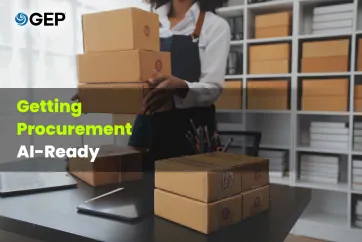
Robotic Process Automation in Procurement: Technology Impacts Could Be Wider Than Anticipated
December 17, 2018 | Inventory Management 5 minutes read
When it comes to the implementation of robotic process automation in procurement, it’s not a question of "if” but “when.” From cost savings to efficiency improvements to risk mitigation, robotic process automation (RPA) could drive pervasive benefits for a function that is increasingly becoming strategic in its outlook. It is predicted that by 2019, as many as 72 percent of global enterprises would leverage RPA to manage their support functions, including procurement. For procurement chiefs, RPA represents a golden opportunity to automate their transactional processes, leaving the human workers to focus on activities that require a significant level of judgment.
At this point, there are many organizations that are trying to figure out what RPA is truly capable of achieving and what it’s not. It’s important to differentiate RPA from other digital technologies such as machine learning (ML) or artificial intelligence (AI) and not use them in the same breath. Unlike both these technologies, robotic process automation doesn’t try to learn or interpret information. It simply mimics the actions of a human user. In that sense, RPA could be the perfect way for procurement organizations to have their first taste of digital and not burn their fingers in attempting to do something that they don’t fully understand.
RPA Technology in Procure-to-Pay
According to a study by The Hackett Group, 45 percent of procure-to-pay organizations believe that RPA will significantly impact the way things are done over the next decade. RPA’s ability to drive improvements in downstream procurement processes is beyond any doubt. Highly transactional and rules-based procure-to-pay (P2P) processes could immensely benefit from the application of robotic process automation. From managing documents to identifying mismatches to processing payments and reconciling accounts, RPA could streamline P2P — driving massive improvements in efficiency, reducing process time and bringing down costs and risks.
While talking about practical RPA procurement use cases, the one that instantly comes to mind is the management of bids and invoices. A typical human-led scenario would entail users accessing tens and thousands of emails daily, checking for accuracy and feeding data into the system. The issue at hand is especially magnified in large organizations which see a huge inflow (of invoices and bids) and lose precious man-hours to such tedious and time-consuming activities. Not to mention the frustrating problem of errors creeping in. With robotic process automation, companies can quickly, accurately and cost-effectively execute these routine tasks while they use their practitioners for more strategic purposes.
But is RPA’s utility merely limited to automating transactional processes?
RPA Technology in Source-to-Contract
In its advanced version, RPA could very well change the way companies operate their source-to-contract (S2C) processes. This is not to say that it can take the place of humans in executing tasks that are complex and strategic in nature. But perhaps, there is a case for using RPA (within S2C) to deal with things that are less strategic or more tactical. For example, use of RPA in contract management to assess contracts, identify deviations from standard practices or look for best prices could be a practical scenario. Similarly, category management is another key area where robotic process automation could be implemented to support spend analysis and category management initiatives. RPA can be equally effective in addressing the more standard aspects of supplier management like background checks, onboarding, etc.
Conclusion
There is no denying that robotic process automation in procurement is still at a nascent stage and there is a long way to go for organizations to make it a mainstream reality. That said, the potential benefits of RPA are there for everyone to see. The overall value that the technology delivers — in terms of efficiency, cost reduction and strategy — makes it a business imperative. Moreover, RPA in many ways marks the beginning of a digital transformation journey for organizations, which can be systematically and gradually broadened to include some of the more complex digital technologies like AI, ML and IoT.
Frequently Asked Questions
RPA (Robotic Process Automation) in procurement can be defined as utilizing RPA technology to streamline the procurement process by removing human error and delays. In addition, RPA technology in procurement can ensure that procurement operations can function at the highest possible capacity.
RPA automates the procurement process by mimicking human behavior. So, highly transactional and rules-based procure-to-pay (P2P) processes could benefit from the application of robotic process automation.
Robotic process automation (RPA) is a software technology that uses software robots to understand information on a screen, complete appropriate keystrokes, navigate systems, identify and extract data, and perform various sets of defined actions.
RPA can introduce cost savings, improve efficiency and mitigate risks in the procurement process. In addition, as procurement is becoming more strategic in its outlook, RPA can drive pervasive benefits for its processes.



